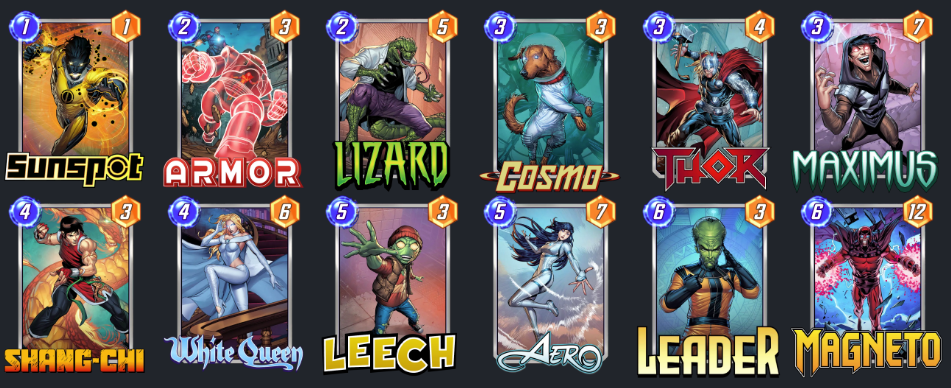Deckbuilding, Pt. 3 - The Meta & Matchups
What’s the best deck in the game?
Meta
/ˈmedə/ (also: metagame)
noun
- The cards, decks, and strategies commonly played and performing well.
- The overall game environment, including card balance, competition level, and player expectations.
adjective
- That which is strongest or most effective.
“That’s a good-looking variant, but it’s not the meta option for your deck.”
The meta describes which cards, decks, and strategies are most commonly played and performing well.
It can also refer to the overall environment of the game, including things like the balance of the cards, the level of competition, and the expectations of players. The meta is constantly evolving as players experiment with new decks and strategies. It’s important for competitive players to keep track of the meta, in order to make informed decisions about which decks to use and how to play them.
Follow The Meta
At any given time, there are about 10 deck archetypes used by players at the highest level. Typically these decks have been heavily optimized, and will generally outperform most other decks over time.
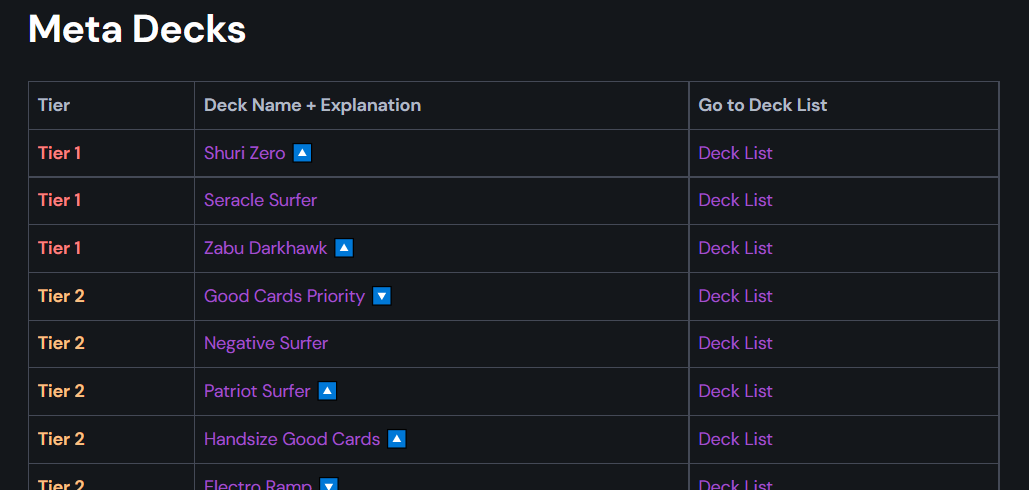
Conveniently, MarvelSnapZone.com provides a tier list of these meta decks that is updated weekly. If you’re new to pool 3, Snap Zone also provides starter decks for every pool 3 card.
In reality, these decks are not set in stone, and will be played with different tech cards, substitutions for rare cards, and other adjustments for personal taste.
Streamers and YouTubers also share their high-performing decks on a regular basis, like KMBest, TLSG, and Snapster.

Finally, you may notice your opponents consistently beating you with their decks. Pay attention, take screenshots, and study their play patterns. You can often piece together an opponent’s deck across just a few games.
Play Meta Decks
Deckbuilding is an engaging, rewarding experience in Marvel Snap. But tuning a deck for success, especially at higher ranks and collection levels, can be a lengthy process that takes many, many defeats before it can hang.
That’s why your best starting point is usually to assemble your most complete meta deck, and learn to play it well before making significant changes.
If you really want to spend time deckbuilding, grind to Infinite first. Once Infinite, you can’t drop below rank 100, and will have logged enough experience with the meta cards to make informed deckbuilding choices.
Matchups
A matchup refers to the specific interaction between two decks or playstyles.
There are usually around 10 popular deck archetypes in the meta at any given time. Ask yourself:
- What is my deck strong against?
- What is my deck weak against?
In a game where small advantages are key, getting an early read on what your opponent is playing is key to knowing whether to snap or retreat.
Deck Types
Part of choosing a deck is based on the matchups you’re likely to face. Here are a few types of decks with regard to their matchups.
The Tier 1 Meta Deck
This deck offers the strongest possible mathematical advantage given the pool of available cards. At high levels, you are likely to encounter these types of decks in nearly all of your games, and for good reason - they offer a dominant playstyle that other deck archetypes simply can’t compete against. They are often oriented around specific cards, like Mr. Negative, Sera, Silver Surfer, Shuri, or other flavor-of-the-month cards.
The tier-1 deck often has strong matchups against a wide variety of decks.
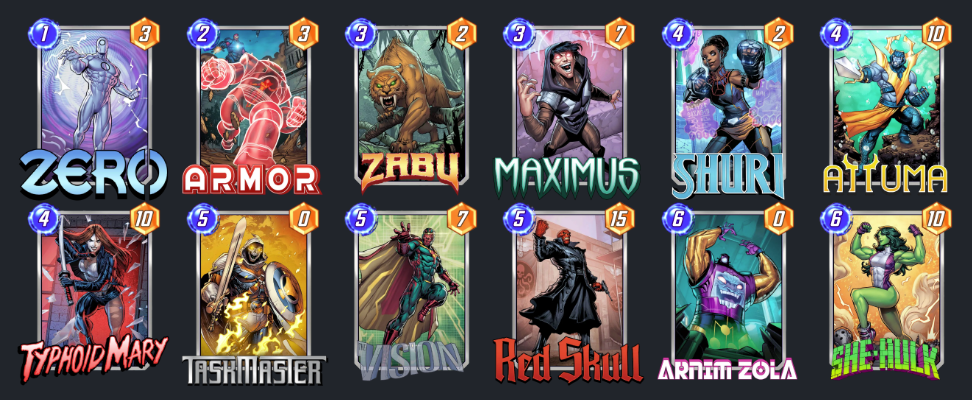
The Anti-Meta Deck
This deck takes advantage of this reality, and is designed to specifically counter the meta decks they’re most likely to see. Often, this is through the inclusion of several tech cards like Cosmo and Enchantress, meant to disrupt the most dominant strategies they encounter. However, anti-meta decks often perform poorly against other decks, as their win conditions are specifically dependent on shutting down their opponent.
The anti-meta deck has a strong matchup against the meta decks it is likely encounter, and usually has even-or-worse matchups against everything else.
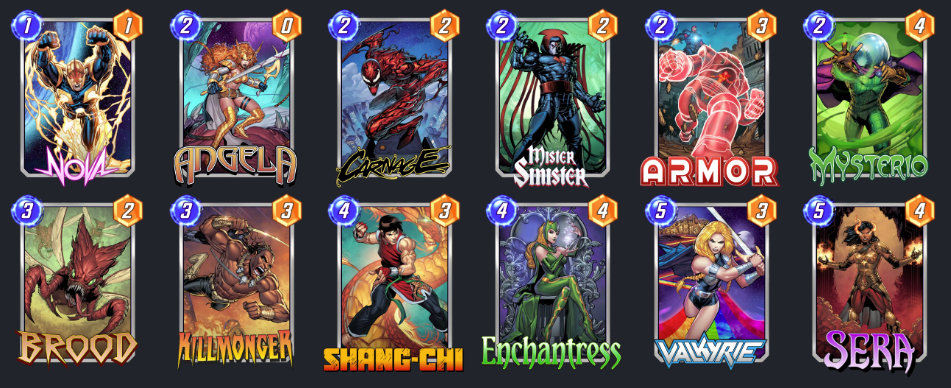
The Off-Meta Deck
This deck has a coherent strategy for its win conditions, but goes against the current dominant trends in the meta. It’s often build around cards that not typically used in the meta, or are considered less effective than the dominant strategies. However, these decks can sometimes be successful, because they catch opponents off guard, or make it difficult to work through end-game math compared to more common decks.
The off-meta deck generally has mediocre-or-worse matchups against most decks it encounters, and relies on surprise and careful play to win.
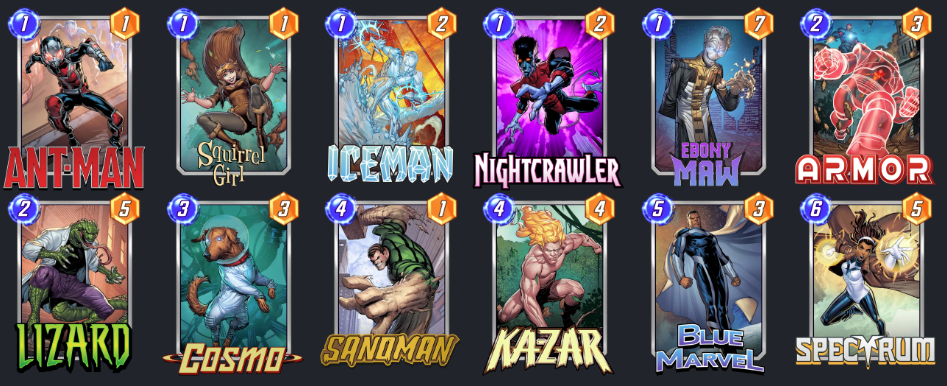
The Good-Cards Deck
This deck is designed to consistently produce powerful and effective plays, regardless of what you draw or your opponent plays. These decks are often built around a core set of strong and flexible cards like Maximus, Aero, and White Queen, and can prevail against a wide variety of different deck types. However, by eschewing complex combos for more straightforward win conditions, they often sacrifice total power output and require careful play and retreats to win over time.
The good-cards deck is notable for having even matchups with most decks it’s likely to encounter.
